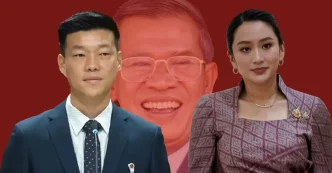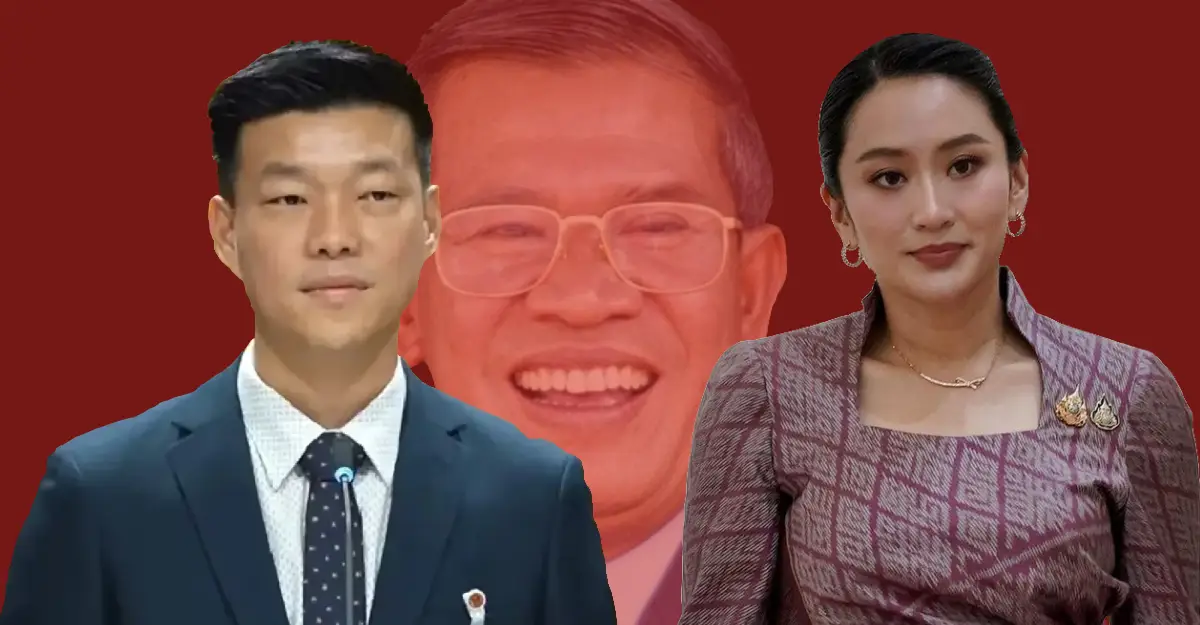A political storm is brewing in Thailand as opposition leader Pita Limjaroenrat has called for the dissolution of the House of Representatives following a leaked conversation between Prime Minister Srettha Thavisin and Cambodian Senate President Hun Sen. The recording, which surfaced late last week, has raised questions about potential breaches of protocol and the integrity of Thailand’s diplomatic relations with its neighbor. Pita, head of the progressive Move Forward Party, labeled the incident a “serious violation of public trust,” urging immediate action to restore accountability in governance.
Details of the Leaked Conversation
The audio, allegedly recorded during a private meeting earlier this month, purportedly captures Prime Minister Srettha discussing sensitive bilateral issues with Hun Sen, a former Cambodian prime minister and influential political figure. While the full contents of the conversation remain unverified, snippets circulating on social media suggest discussions around border policies and economic cooperation that critics claim overstepped the bounds of standard diplomatic engagement. The opposition argues that such talks, if confirmed, should have involved formal channels and parliamentary oversight.
Pita Limjaroenrat addressed a press conference in Bangkok on Tuesday, stating, “This is not just a personal misstep; it’s a systemic failure. The prime minister must answer to the public and dissolve the House to allow for a transparent investigation” he said. His remarks have ignited a fierce debate over the legal and ethical implications of the leaked recording, with Move Forward Party supporters rallying behind calls for greater governmental accountability.
Political Context and Rising Tensions
Thailand’s political landscape has been volatile since the 2023 general election, which saw the Move Forward Party emerge as a significant force challenging the entrenched power of conservative and military-aligned factions. Prime Minister Srettha, representing the Pheu Thai Party, has faced criticism for perceived alignments with establishment interests, despite his coalition’s reformist rhetoric. The leaked conversation adds fuel to an already polarized environment, with opposition parties seizing the opportunity to question the government’s transparency.
Relations between Thailand and Cambodia have historically been fraught with tension, particularly over border disputes such as the Preah Vihear Temple conflict. While recent years have seen improved cooperation, any perceived overreach in diplomatic dealings remains a sensitive issue for Thai nationalists and political observers alike. Analysts suggest that the timing of the leak—amidst ongoing debates over economic policies and regional security—could amplify public discontent with the current administration.
Government Response and Legal Implications
The Prime Minister’s Office has yet to release an official statement on the authenticity of the recording or the context of the alleged conversation. However, government spokesperson Chai Wacharonke issued a brief comment to local media, asserting that “all diplomatic engagements are conducted with Thailand’s national interest at heart” he said. The spokesperson declined to address whether an investigation into the leak would be initiated, leaving room for speculation about the administration’s next steps.
Under Thai law, unauthorized recordings of private conversations could violate provisions of the Computer Crime Act B.E. 2550, which prohibits the dissemination of illegally obtained data. If the recording is proven to be authentic and was obtained without consent, those responsible for the leak could face legal consequences. Conversely, if the content reveals misconduct by public officials, opposition leaders argue that it could serve as grounds for further scrutiny, potentially leading to calls for impeachment or other punitive measures.
Legal experts caution that the situation remains murky without verified evidence. “Until the recording’s origins and contents are independently confirmed, any accusations remain speculative” said Professor Thitinan Pongsudhirak, a political analyst at Chulalongkorn University. He added that the incident highlights the urgent need for clearer guidelines on diplomatic transparency and accountability in Thailand.
Public Sentiment and Regional Implications
The leak has sparked a flurry of reactions on social media platforms, with hashtags related to the incident trending across Thailand. Many netizens express frustration over perceived secrecy in government dealings, while others question the motives behind the leak itself. Posts on X suggest a divide between supporters of the opposition, who view the incident as evidence of systemic corruption, and government loyalists, who dismiss it as a politically motivated smear campaign.
Beyond Thailand’s borders, the incident risks straining ties with Cambodia at a time when regional cooperation is critical. The Association of Southeast Asian Nations (ASEAN) has emphasized unity in addressing shared challenges such as economic recovery and security threats. Any fallout from this controversy could complicate joint initiatives, particularly those involving border management and trade agreements. Cambodian officials have so far refrained from commenting on the matter, though analysts note that Hun Sen’s long-standing influence in regional politics makes his involvement in any scandal a point of concern.
Opposition Strategy and Calls for Reform
Pita Limjaroenrat and the Move Forward Party have positioned themselves as champions of reform, advocating for structural changes to Thailand’s political system. Their call for House dissolution is not merely a response to the leaked conversation but part of a broader push to challenge what they describe as entrenched elitism in governance. The party has proposed measures to enhance parliamentary oversight of executive actions, including stricter protocols for diplomatic engagements.
“The Thai people deserve a government that operates in the light, not in the shadows” Pita emphasized during his press conference. The opposition leader also hinted at plans to introduce a motion of no confidence if the prime minister refuses to act, a move that could further destabilize the fragile coalition government. Political observers note that while such a motion may not succeed given the current parliamentary arithmetic, it could galvanize public support for the opposition ahead of future elections.
Broader Implications for Thai Democracy
This controversy comes at a pivotal moment for Thailand, as the country grapples with questions about the future of its democracy. The 2014 military coup and subsequent years of junta rule left deep scars on the political system, with many citizens and activists calling for greater freedoms and accountability. The rise of progressive movements, led by figures like Pita, reflects a growing demand for change, particularly among younger generations who have taken to the streets and online platforms to voice their frustrations.
The leaked conversation, if substantiated, could serve as a litmus test for how far Thailand has come in addressing issues of transparency and trust in public institutions. It also raises questions about the role of technology in modern politics, as digital leaks and misinformation campaigns become increasingly common tools in political warfare. For now, the burden lies on both the government and opposition to navigate this crisis without further eroding public confidence.
Looking Ahead
As the fallout from the leaked conversation unfolds, Thailand stands at a crossroads. Will this incident catalyze meaningful reforms, or will it deepen the divides that have long plagued the nation’s politics? With both sides digging in, the coming weeks are likely to see intensified debates over accountability, diplomacy, and the very nature of governance in the kingdom. For many Thais, the hope is that out of this controversy emerges a renewed commitment to transparency—one that prioritizes the public’s right to know over political expediency.















